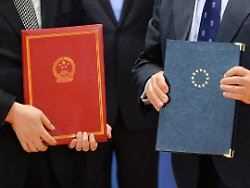Wednesday 05 May 2021
“Personal embarrassment” for Xi
Praise for stopping the EU-China treaty
It is another blow to the tense relationship between the EU and China: the EU Commission is putting the ratification of the investment agreement that has already been signed on hold. Approval comes from the European Parliament and the Federal Foreign Minister. An economist expresses criticism.
Members of the European Parliament have welcomed the halt to ratification of the investment protection agreement with China. The Green politician Reinhard Bütikofer told journalists that he saw the EU-China policy “before a redefinition”. China’s President Xi Jinping has “grossly miscalculated” the sanctions against EU representatives for criticizing the human rights situation in the People’s Republic. In Parliament it was therefore clear that “the vast majority of the parliamentary groups” currently do not want ratification of the economic agreement.
The Vice President of the EU Commission, Valdis Dombrovskis, announced on Tuesday that his authority had temporarily suspended efforts to ratify the investment protection agreement negotiated at the end of last year. In an interview with the AFP news agency, he referred to the tensions in the mutual relationship and mutual sanctions. Federal Foreign Minister Heiko Maas also supports the Commission’s decision. “I think that’s a consistent reaction from Brussels,” said the SPD politician on the sidelines of the G7 foreign ministers’ meeting in London.
The dispute between the EU and China escalated in March. At the time, the EU imposed sanctions on four party and regional representatives from Xinjiang Province for their actions against the Muslim Uyghur minority. In response to the EU sanctions, Beijing for its part imposed punitive measures against EU politicians and scientists, including Bütikofer and CDU MEP Michael Gahler.
The ratification stop was “also a personal embarrassment” for President Xi, said Bütikofer. Last year he declared Europe “a top priority”. Now he is not achieving his goals despite massive help from Chancellor Angela Merkel and French President Emmanuel Macron.
“Been in the fridge for a long time”
The CDU MP Gahler said that he too was behind the temporary halt to ratification. “It’s good.” However, he continues to believe that it is important to “set a framework” in economic relations with China so that European companies have equal opportunities to compete.
“The agreement has been in the fridge for a long time,” said the chairman of the trade committee, Bernd Lange. The SPD politician sees “in the next two years (…) hardly any chance” of advancing ratification – “especially not as long as the sanctions against colleagues continue to apply”. Lange, however, also warned against pursuing a mere “strategy of demarcation” with China. There must be a “mix of demarcation and partnership”.
On the other hand, criticism of the EU approach comes from the Kiel Institute for the World Economy (IfW). In view of the escalating diplomatic tensions between the EU and China, the decision is not an unexpected step, said IfW President Gabriel Felbermayr. Nevertheless, the step is regrettable. The agreement reached at the end of 2020 under the German EU Council Presidency is a milestone for the economic relationship between the two regions. Even under former President Donald Trump, the United States concluded an agreement with China with similar elements, which has been in force for more than a year and to which the current US administration is sticking unchanged.
“It justifies a clear preference for US investors over European investors, for example in the area of financial services,” Felbermayr pointed out. The IfW considers it very unlikely that China, now the second largest economy in the world, will change its behavior on the basis of sanctions.
.
